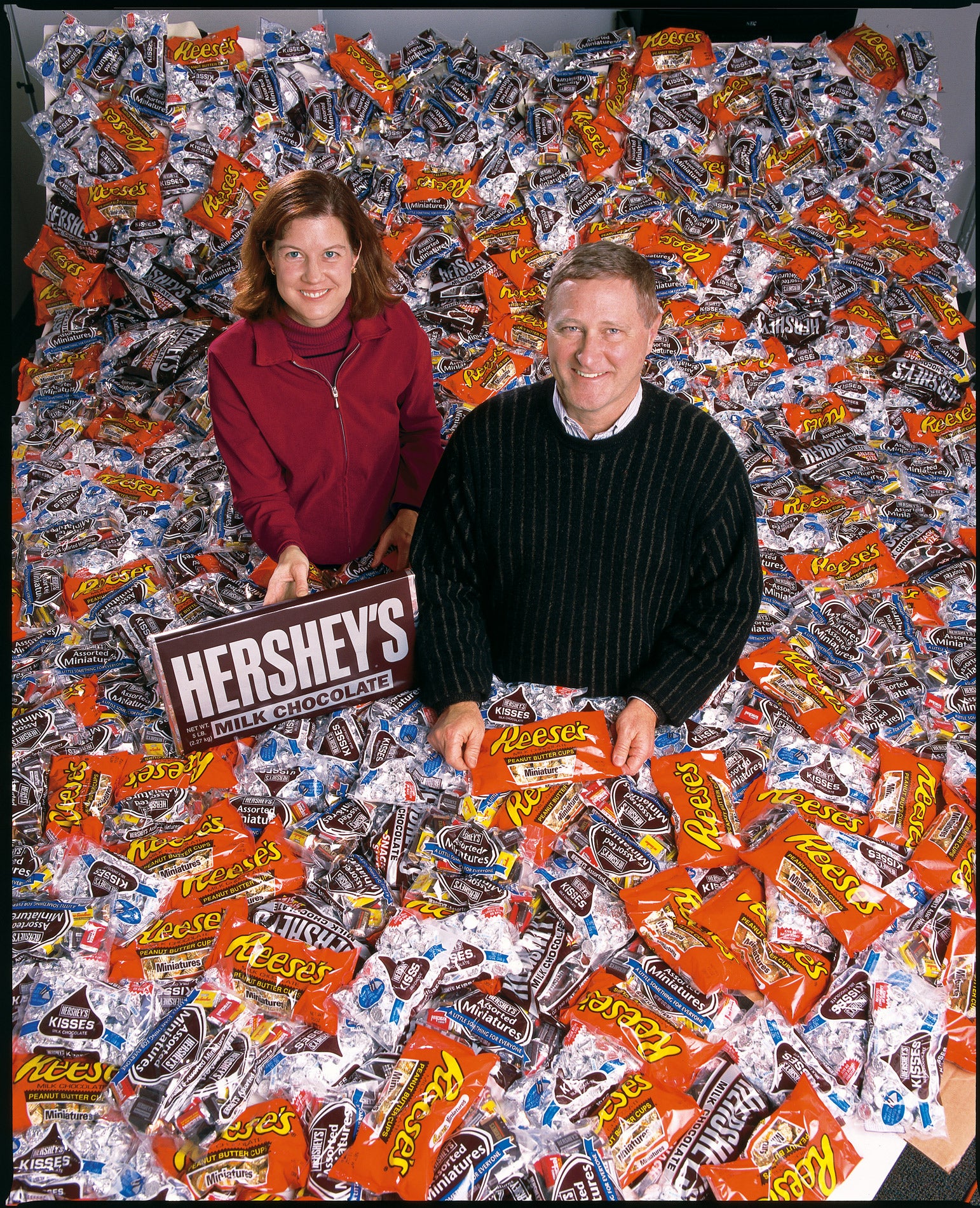On a hill just past the intersection of Chocolate Avenue and Cocoa Avenue sits the world headquarters of the Hershey Foods Corp. Not a good place to work if you don’t enjoy chocolate. Fortunately, both Lois Duquette ’91 and Burt Snyder ‘ 75 have an affinity for the product that has made Hershey’s the largest candy company and one of the most recognizable brand names in the United States.
It was 100 years ago that Milton Hershey, having just sold his caramel business, decided to build a chocolate empire on the dairy land of central Pennsylvania. The reminders of Milton Hershey and the product he made famous are everywhere–from the smell of chocolate wafting through the air to the street lamps shaped like Hershey’s Kisses, not to mention Hershey Theatre, the Hotel Hershey and the Milton S. Hershey Medical Center.
“Hershey is kind of like a mythic figure, someone that is revered in this area,” said Duquette, senior counsel of Hershey Foods. “I mean, people still call him ‘Mr. Hershey.’ When I was growing up, this was the premier place to work. It’s a company that has a history of treating people right and doing great things. People really think highly of Hershey, and it’s not just because he built the world’s biggest chocolate company: It’s what he’s done for the town and the school.”
The Milton Hershey School was the primary beneficiary of Milton Hershey’s lifetime of largesse. Hershey and his wife, Catherine, were unable to have children of their own, so they created a school and home for orphaned boys. The school opened in 1910, and eight years later, Hershey put all of his company stock in a trust he created for the school. Thus, in 1918, the Hershey Trust–and, by extension, the Hershey School–became the majority shareholder of the company.
Hershey did not limit his philanthropy to central Pennsylvania, notes Snyder, who as senior vice president is responsible for Hershey Foods’ law department, government relations and international operations. When the company had extensive sugar plantations and refineries in Hershey, Cuba (now known as Camilo Cienfuegos), Milton Hershey also built a school and orphanage for that community.
But it is in Hershey, Pa., that Milton Hershey continues to have the greatest impact. The town–actually an unincorporated part of Derry Township–is dominated by three businesses: the Hershey Trust, Hershey Foods Corp. and Hershey Entertainment and Resorts Co. (wholly owned by the trust).
“Certainly, companies that have their headquarters in New York City, they could leave and no one would miss them,” said Snyder. “We’re part of this community here.”
The triumvirate that runs the community, though, doesn’t always exist in perfect harmony. Last summer, the trust attempted to diversify its holdings by selling its shares in Hershey Foods. After significant protests from residents and employees who feared an out-of-town buyer would move production elsewhere, the trust dropped its plan.
With order restored to one of the few “company towns” remaining in America, Duquette and Snyder can continue their efforts to protect and expand the Hershey chocolate empire.
For Duquette, this sometimes means visiting the chocolate plants to research the veracity of product liability claims. Though it’s hard to imagine not feeling like Charlie in the chocolate factory as more than 10,000 Hershey’s Kisses roll by every minute, the trips are serious business.
“Did you see the way the chocolate goes through the screens?” asks Duquette. “If someone is claiming that there is a foreign object in a product that I know is going through that screen, that doesn’t make sense. Either it was tampered with or they’re making it up.”
Duquette also works with the marketing department on product placement opportunities. Hershey’s had arguably the most successful product placement in movie history when E.T. took a liking to Reese’s Pieces. Some of the more recent efforts have been a bit subtler. In “Antz,” for instance, a few Hershey’s wrappers littered the ant wonderland. “I work on that, and it’s kind of fun,” said Duquette. “It’s still a contract, but it’s fun.”
“Fun” is a word that never seems too far from Duquette’s and Snyder’s lips. How could it be, when you work for a company that has break rooms filled with candy bars? However, both Duquette and Snyder say there are more benefits to the job than just the product.
“It is easy to have the company as a client because people here will listen to advice, and there isn’t any difficulty getting people to understand what is right and wrong,” said Snyder. “When you tell them that you shouldn’t do something, they don’t do it.”
And there’s one added benefit to the job: With three children each, Snyder and Duquette never hear complaints when they bring their work home.
–Michael Rodman
